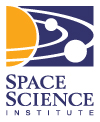Exhibition Development Group
NCIL staff have over fifteen years' experience producing both large and small traveling exhibitions on a variety of STEM topics: space weather, planetary science, astrobiology, and earth science. The Exhibition Development Group oversees all phases of exhibit planning and production from concept generation through fabrication. We also manage the national tour of our traveling exhibitions. NCIL exhibitions rely on contributions from the Digital Learning Group, Professional Development Group, and Learning Research and Evaluation Group.
NCIL's exhibitions incorporate hands-on, age-appropriate components suitable for all age groups and learning styles. We target underserved communities (e.g. rural) and the institutions that serve them, such as small science centers and libraries. Our exhibitions benefit from strong partnerships with STEM professionals, educators, artists, designers, and fabricators. Recent focus has been on designing inquiry-based learning experiences for digital platforms such as a Microsoft Surface, multi-touch tables, and globes.
An NCIL exhibition is much more than just the traveling exhibit. Exhibit education programs include enrichment activities, in-person and virtual workshops (for both classroom and museum educators), downloadable science resources, and connections for bringing scientists and other public programs to host venues. Classroom materials are standards-based and aligned with the exhibit so that teachers can do the activities in their classroom either before or after a field-trip. We also develop interactive websites that extend the scope and reach of our exhibits.
If you are interested in collaborating with NCIL on producing a STEM exhibition, please contact Paul Dusenbery at dusenbery@spacescience.org.
Current Projects
- Giant Worlds: A Voyage to the Outer Solar System (Funding: NSF and NASA)
- Space Weather Outreach and Discover Space (Funding: NSF)
- Great Balls of Fire: Comets, Asteroids, and Meteors (Funding: NSF and NASA)
- Discover Earth (Funding: NSF)
- STAR Library Education Network: a hands-on learning program for libraries and their communities (Funding: NSF)
- Finding NEO (Funding: NSF and NASA)


